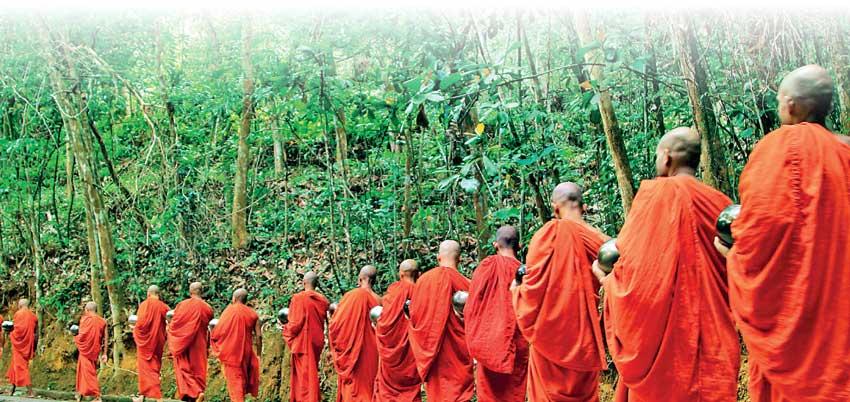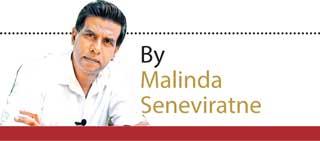16 Jun 2022 - {{hitsCtrl.values.hits}}

 ‘Upasakamma ipaduna heena kule…’ (Translatable as ‘[of] the devout mother who was born into a lower caste…’) is one of the songs in Nanda Malini’s ‘radical’ album ‘Pawana (The wind).’ While most of the lyrics were penned by Prof. Sunil Ariyaratne, this was attributed to Ranchagoda Lamaya, the nom de guerre used by well-known journalist Sirilal Kodikara. Pawana was quite popular in the late eighties. Nanda Malini and Sunil Ariyaratne rode what they believed was a radical political wave at the time. The album covered a lot of areas, caste-discrimination being one.
‘Upasakamma ipaduna heena kule…’ (Translatable as ‘[of] the devout mother who was born into a lower caste…’) is one of the songs in Nanda Malini’s ‘radical’ album ‘Pawana (The wind).’ While most of the lyrics were penned by Prof. Sunil Ariyaratne, this was attributed to Ranchagoda Lamaya, the nom de guerre used by well-known journalist Sirilal Kodikara. Pawana was quite popular in the late eighties. Nanda Malini and Sunil Ariyaratne rode what they believed was a radical political wave at the time. The album covered a lot of areas, caste-discrimination being one.
This particular song touched on all kinds of issues associated with the Buddhist Order including deviation from prescribed path, disturbing association with politicians, profit-seeking and of course the significance of caste. The lyricist doesn’t paint with a broad brush, however, pointing out the wholesome and even heroic role played by the ‘cheevaraya’ or ‘robe’ across history. The tone is unabashedly harsh at odds with the ideals of the cheevaraya of course for it essentially calls out raucously for blood of the perceived enemy: ‘rata kana unva vanasaa rata deya rekuma, eyai ape ada davase mahanakama (today’s role of the bhikkhu is to destroy those who are destroying the country).’

Nevertheless, it re-poses a perennial question: the role of the bhikkhu or the Maha Sangha if you will; that role has been defined in the Word of the Enlightened One. It has, is and will be interpreted as per the whims and fancies of interpreter. If ‘moment’ was the overriding factor in such definition, then the bhikkhu, drawn out of the Order and the Dhamma, can be assigned innumerable responsibilities. Simply put, today’s role could be drastically different from yesterday’s and tomorrow’s even more sore.
To each his/her own interpretation would be the dispassionate and necessarily liberal Buddhist response, if such is solicited. Indeed, one might even argue that the individual bhikkhu is free to interpret as he will, subject perhaps to the Vinaya rules, which again are open to multiple interpretation (like any doctrinal tract, religious, philosophical or ideological). By the same token, then, no bhikkhu (or for that matter no bikkhuni, upasaka or upasika) can be found fault with for choosing one among many available paths of being and practice.
Society, however, is not kind. People are quick to judge and even act as though they are the final arbiters regardless of their credentials either as adherents or students. And so all chosen paths can be criticized
Society, however, is not kind. People are quick to judge and even act as though they are the final arbiters regardless of their credentials either as adherents or students. And so all chosen paths can be criticized. Nanda Malini essentially rubbishes the aranyavasi haamuduruwo and the hamuruduwo in the pansala quietly attending to the needs of a community; she would hail the bhikkhu on the street, so to speak, voice raised, fist clenched, calling people to arms and ever ready to wield club or gun. We had, after all, a ‘Theraputtabhaya Balakaya’ during the bheeshanaya, i.e. the name given to the purportedly armed-wing of pro-JVP monks. Over 500 monks were slaughtered by the then regime of Ranasinghe Premadasa, most of them having nothing to do with the JVP. That’s another story, but a related tale is the ironical one about his son Sajith’s party (SJP) ‘marching’ from Kandy to Colombo playing/singing songs from the Pawana album which of course originally targeted his father’s regime!
So how can a bhikkhu, and by extension Buddhist society (or any religious collective for that matter) perceive role? Perhaps one could draw from the Buddha’s prescription: charatha bhikkhave charika; bahujana hithaya bahujana sukhaya (Go forth O’ Monks, travel, and commit yourselves to the well-being of the people). ‘Well-being’ of course could be niduk, nirogi, suva (free of sorrow, good health and contentment). Obtaining that could be political, overtly or inconspicuously, seen as such or else disavowed.
What then is the nature of the ‘ada davasa’ if we are to draw from the song? Ousting a government/ruler considered to be corrupt or tyrannical (whether or not this is so and whether or not one has fleshed out transition, power-transfer and alternative)? Perhaps. However there could be disagreement over objective and method. And anyway, even if one stretches the meaning of ‘moment’ to denoting an era or the tenure of a regime/leader, what is urgent, today and in Sri Lanka, is as economic as it is political. Indeed if one were to collapse ‘moment’ to the ‘right now’ then we have to talk about crisis, the elemental components and most importantly, that which the ‘bahujanathava’ feels most acutely. Hunger, or at least the possibility of hunger given the dark warnings of a global food crisis which can only manifest itself locally in a more extreme form.
What then, in this context, is the ‘ada davase mahanakama’? Clearly it has to be related to food, its production and its distribution.
There are thousands of temples in this country. Almost every temple stands in large compounds. Then there are temple-lands, large tracts bequeathed by the devout or as grants from kings. The bhikkhu, moreover, is historically one of the key figures in any village where the majority are Buddhists. A leader, respected and even revered, and sought when guidance is required. Someone with a great potential to mobilize the particular community. Ideal to lead, organize or bless a vagaa sangramaya (a crop-planting effort). Now that would be a ‘mahanakama’ that no one would object to. An ‘ada davase’ effort. Something real. Something grounded. Something that can take root. Something that will yield something wholesome for a community and in aggregate the entire nation.
‘Bahujana hithaya, bahujana sukhaya’ need not be the preserve of the bhikkhu. It is not the preserve of Buddhists and Buddhism either. Now that would be a calming and beneficial breeze. A ‘pavana’ devoid of anything caustic, not hot and corrosive, but one that is balmy, refreshing and wholesome.
[email protected]
27 Nov 2024 14 minute ago
27 Nov 2024 24 minute ago
27 Nov 2024 28 minute ago
27 Nov 2024 46 minute ago
27 Nov 2024 2 hours ago